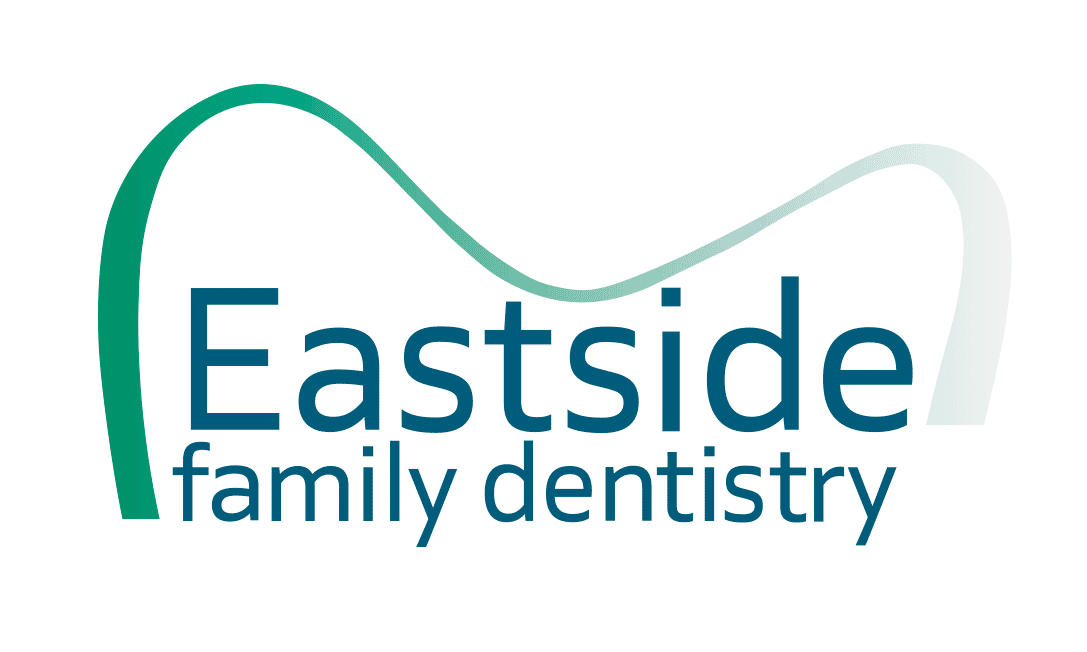Cleanings & Exams
Dr. Cristescu will always begin your appointment with an oral exam so we can assess any problems with the teeth such as signs of damage, discoloration, or tooth decay. Then, a dental cleaning will be performed, which consists of scaling and polishing to remove plaque and tartar from around the gums and between your teeth. Then, a high-powered electric toothbrush is used to polish your teeth.
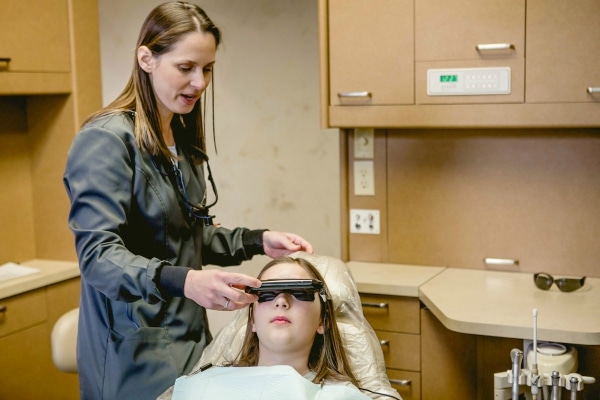

Dental Crowns
A dental crown is, essentially, a false tooth that is designed to cover and protect all of your remaining enamel. They are typically used to treat issues like large cavities, and cracked and damaged teeth, or to restore teeth that have been treated with root canal therapy.
Most dental crowns are made of porcelain ceramic materials, which are very durable and help protect the remaining tooth structure. Porcelain also looks just like your natural tooth structure and has a similar hardness.
Your dental crown will look and feel just like a natural tooth. To prepare for crown placement, the remaining tooth structure will be trimmed and prepared for the crown. Then, the crown will be bonded to your tooth, covering your natural tooth all the way down to the gum line and protecting it from further damage.
Here are a few of the biggest advantages of restoring your smile with a crown:
- Restores your smile & bite – Crowns help cover your damaged tooth and restore your ability to bite and chew without pain. Your crown will also restore the appearance of your damaged tooth, so you can smile with confidence.
- Long-lasting results – Dental crowns usually last 10-15 years with proper care, so your tooth will be protected and your smile will continue to look great for years to come.
No special care required – To care for your dental crowns, simply brush and floss normally and see Dr. Cristescu for a routine cleaning every six months. That’s it!
Dental Bonding
Dental bonding is a cosmetic treatment that involves the application of a special dental resin to fill in imperfections and restore your teeth, providing you with a more even and appealing smile. Dental bonding can be used to treat minor imperfections like chips, gaps, staining, and other minor issues.


Understanding The Dental Bonding Process
The first step of dental bonding is to clean your teeth and prepare them for the application of dental resin. Then, Dr. Cristescu will select a resin that matches the color of your surrounding teeth, and apply it directly to your tooth. Using special tools, she will modify the resin until it’s the proper shape and size. Then, a UV light is used to harden the resin. Once the resin has hardened, Dr. Cristescu will trim the resin to refine the shape even further and sculpt it until it looks completely natural. Then, the tooth will be polished and buffed, and the procedure is complete. The entire process usually takes only about 30-60 minutes per tooth.
The Benefits Of Dental Bonding
- Affordable – Dental bonding is often more affordable than comparable treatments like veneers or cosmetic crowns, making it a better option for cosmetic dentistry if you’re on a tight budget.
- Natural look & feel – The dental resin looks just like your natural tooth enamel because Dr. Cristescu chooses the precise color of your surrounding teeth before applying it. Your tooth will look natural to others, and feel completely natural in your mouth!
- Non-invasive – Unlike a veneer or crown, no enamel is removed during the dental bonding process. This means your natural enamel is preserved, and there is no drilling or discomfort during the procedure. Most patients do not even need to be numbed during the bonding procedure.
- Fast results – You can have multiple teeth bonded in one appointment, and restore your smile in just a single day at Eastside Family Dentistry. There are quite a few problems that fall under the category of an emergency. If you aren’t sure, call us and we can tell you. Having an injury to your teeth or gums directly, especially if there is bleeding or your teeth have shifted, is definitely considered an emergency. Do what you can to stop the bleeding by putting pressure on the injured area, and call us immediately. The same goes if you fell and your teeth were part of the impact.
- Knocked-Out Teeth – If you have a knocked-out tooth, then you definitely need to come in and see us. Pick the tooth up by the white part (the crown), ideally by where you would chew. Gently rinse the tooth in a little bit of water, and place the tooth in a small jar or container filled with saliva or milk. This will preserve the tooth while you travel to our office.
- Oral Burns – If you ate something that was far too hot, this is likely going to leave you in pain. If your mouth blistered, then drink something cool and keep the area clean. Don’t eat anything else that is hot, and don’t eat anything crunchy or salty as this could irritate the blisters. If there is no bleeding, then you can likely come in at our next appointment opening. However, if you do have bleeding, contact us and find out what the best care option would be.
- Loose Teeth – If a tooth got knocked loose, take a little paper towel or ideally gauze and hold the tooth in place, but don’t bite down hard. Come in and see us so we can determine if the tooth is still alive, and so we can set the tooth to heal if it is. Most teeth that are knocked loose are able to be salvaged, but it is important to let them heal properly.
- Pain & Swelling – See your dentist right away because gum pain or swelling can be the symptoms of an abscess (infection) that forms in gum tissue or in a tooth’s root and the area that surrounds it. There are many reasons why gums can swell, become painful, or be abscessed. It is possible that you may need a root canal or an extraction. Only a thorough exam by your dentist in Issaquah, WA can identify the underlying cause.

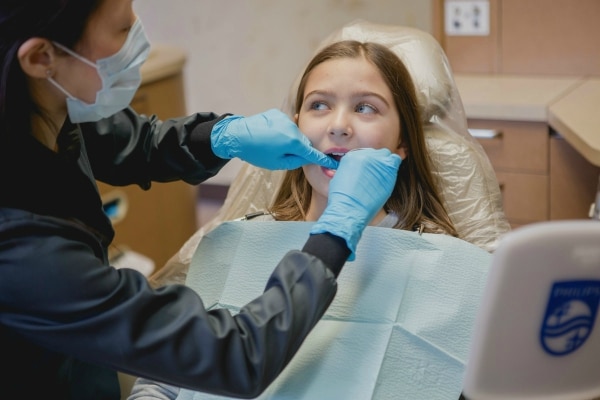
Pediatric Dentistry
If you need a kind, gentle, and patient family dentist in Issaquah, WA to care for your child’s smile, Dr. Alexandra Cristescu is the best choice. At our office, we offer family dentistry for kids of all ages. Learn more about our family and children’s dentistry services below, or contact us now to schedule your child’s first appointment at Eastside Family Dentistry.
When To Start Bringing Your Children To The Dentist
Not sure when you should start bringing your kids to see the dentist? It’s earlier than you may think! The AAPD (American Academy for Pediatric Dentistry) suggests that parents bring their kids to a dentist when they turn one year old, or whenever their first tooth comes out.
Seeing a dentist from such a young age helps your child become more familiar with the process, reduces their likelihood of developing dental anxiety, and also encourages your little one to develop excellent, lifelong oral health habits.
At our office, Dr. Cristescu offers a wide variety of dental services for kids of all ages. Our dental services for kids include:
- Teeth cleanings, oral exams, and x-rays for tracking your child’s oral development and avoiding cavities.
- Fillings and crowns to restore your child’s tooth, provide them with relief from pain and sensitivity and keep their smile healthy.
- Fluoride treatments protect against cavities and strengthen teeth.
- Dental sealants for cavity-prone molars.
- Gentle dental sedation for just about any appointment at our office, including routine cleanings.

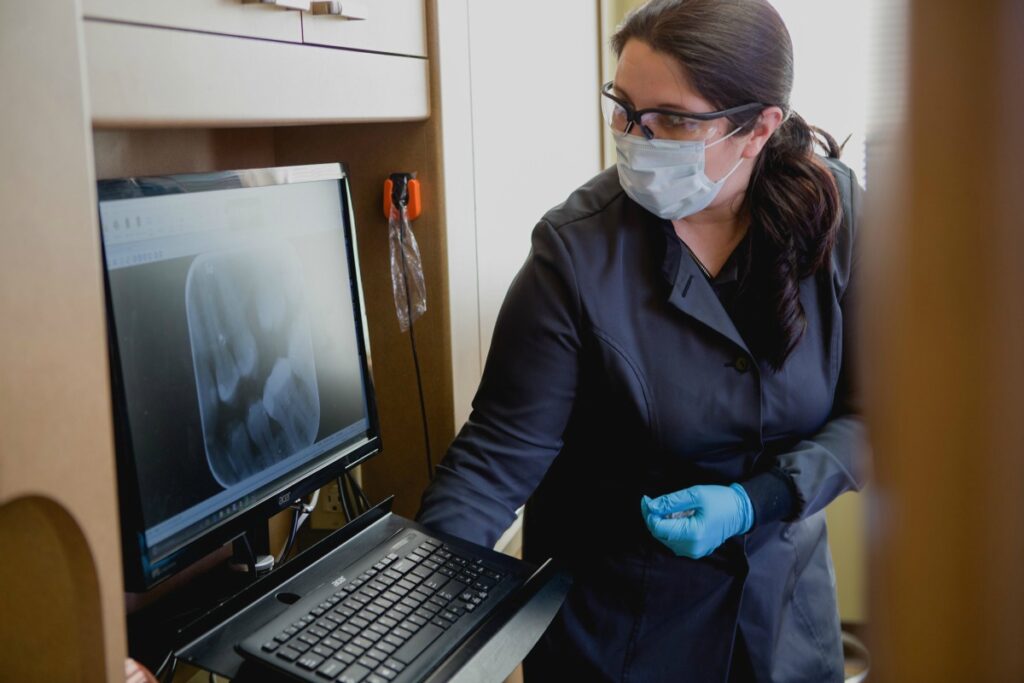
Root Canals
Root canal therapy might have a scary reputation, but it’s one of the most common restorative dentistry procedures in the U.S. with 15 million of them performed every year.
When you get a root canal at Eastside Family Dentistry, you have nothing to worry about. The procedure is simple, pain-free, and fast.
Understanding The Root Canal Therapy Process
Root canal therapy is used to remove infected pulp – the soft tissue located below the enamel of the tooth. In cases of severe tooth decay or impact damage to the tooth, this pulp can become infected and cause significant pain.
The process of administering root canal therapy is actually quite similar to filling a cavity.
First, your Issaquah, WA dentist will clean your tooth, and then drill a hole that allows her access to the pulp. The infected pulp is removed with specialized tools. The tooth is then disinfected and filled with a substance called gutta percha. This rubber-like material provides structure and support for the tooth and replaces the original pulp.
A filling is placed in the tooth to complete the process. Sometimes, more often with molars, further restoration is needed. A crown will be manufactured and placed, protecting your tooth from further damage.
Typically, there is almost no pain or discomfort, and the entire procedure can be performed in less than 90 minutes.

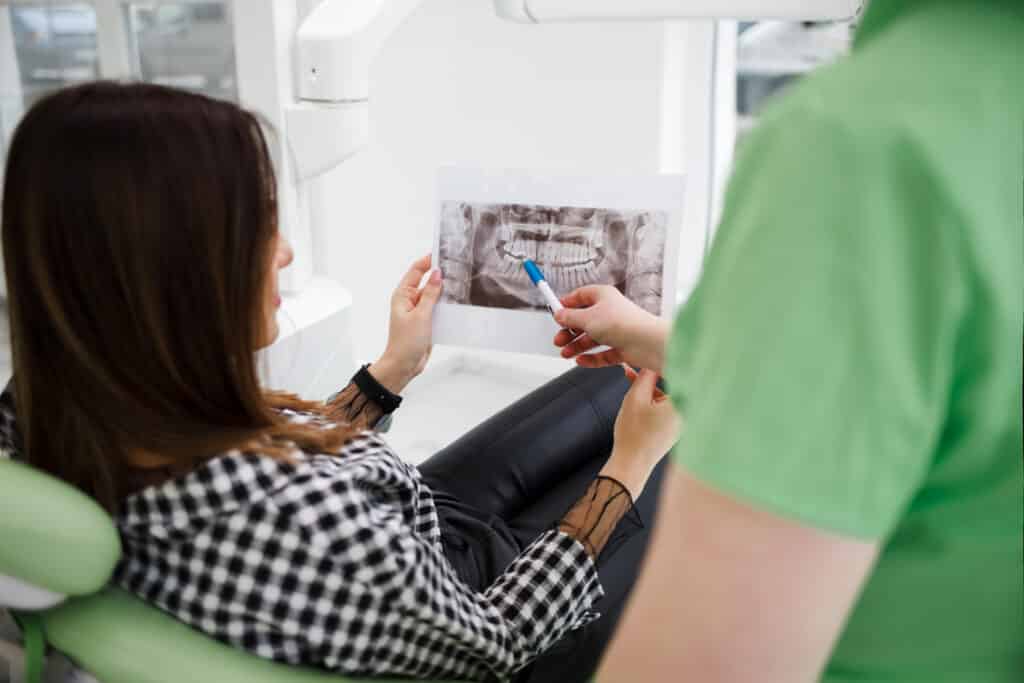
Signs You May Need Root Canal Therapy
Think you might have an infected tooth? Here are a few of the common signs that indicate you may need root canal therapy:
- Serious, chronic toothache or pain
- Pain that radiates through the ear and jawbone
- Sensitivity when chewing, biting, and placing pressure
- Extreme sensitivity to heat and cold
- Tooth darkening or discoloration
- Swelling or the reddening of the gumline near a sensitive tooth
If you are suffering from one or more of these symptoms, schedule an appointment at Eastside Family Dentistry right away.
Root canal therapy is the best way to treat an infected tooth, for a variety of reasons:
- Save your original tooth. It’s always best to save your natural teeth.
- Inexpensive & fast. If you still have options for treatment, why not go with the less expensive choice? Root canal therapy is also a relatively quick procedure, requiring one appointment for the procedure, and one to place the crown if needed.
Relieves pain immediately. This is the biggest benefit of a root canal. Once the infected pulp is removed, you’ll get relief from the pain of an infected tooth.
Periodontal Therapy
Here at Eastside Family Dentistry, we make a point to encourage each of our patients to consider their periodontal health on a daily basis. We want you to understand just how invaluable the health of your gums really can be. The bone and gums are the foundation to a healthy and functional dentition. Our goal is to educate you while we treat you so that when you go home, you feel informed to do everything you can to care for your gums properly. Periodontal care can include deep cleanings, gum grafts, and other measures taken to protect the smile from ailments that may cause gum and tissue damage.
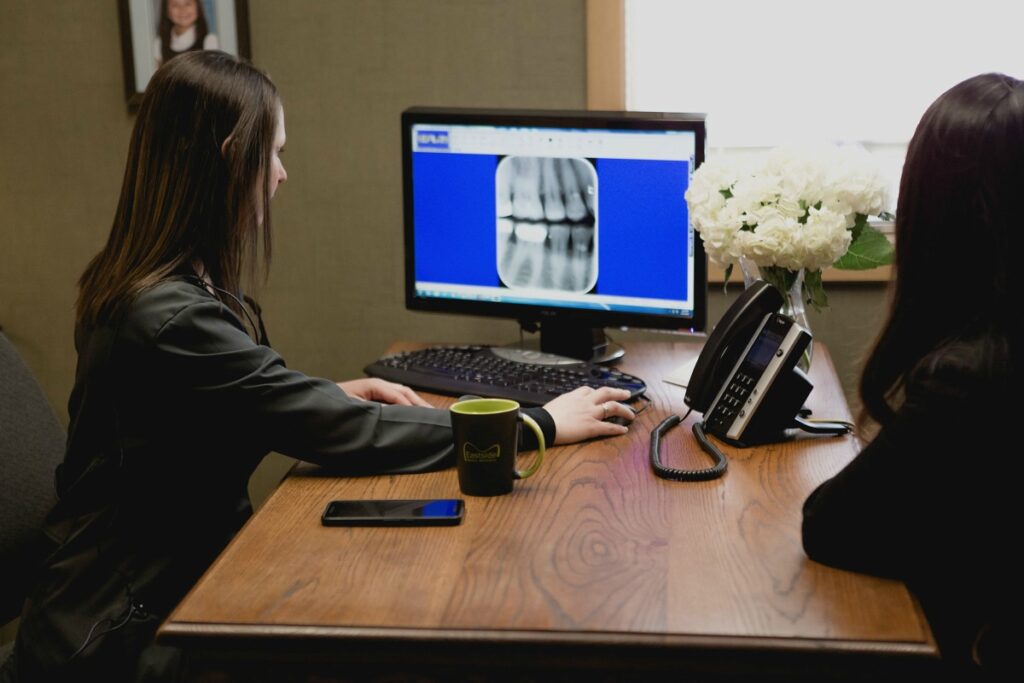

What Causes Gingivitis & Gum Disease
Gum disease is caused by poor oral hygiene, though risk factors (such as genetics) can play a large role. When you don’t clean your mouth properly, plaque and tartar begin to build up between your gums and teeth, causing infection. Over time, the infection will worsen, destroying the gum tissue and the root of your tooth, forming periodontal “pockets.” Bacteria continue to colonize this area and multiply, attacking your gums, teeth, and jawbone, and eventually causing tooth loss.
What Are The Signs & Stages Of Gum Disease?
Gum disease has a number of different stages, and each one has different symptoms and signs. Gingivitis is the first stage of gum disease and is the least serious since it does not cause permanent damage to your gums or teeth. Symptoms of gingivitis include:
- Bleeding when brushing
- Swollen or puffy gums
- Discolored purple or red gums
- Halitosis (bad breath)
- Increased gum and tooth sensitivity
With proper care, gingivitis can be completely eliminated. However, if gum disease continues to progress, it moves into the next stage, called periodontitis. In this stage, permanent damage is done to the roots of the teeth and the gums. Symptoms include:
- Gums bleeding for no apparent reason
- Gum recession
- Changes in the position of your teeth or bite
- Pain when chewing or putting pressure on a tooth
- A foul taste in your mouth
The next stage of gum disease is called “advanced periodontitis.” In this stage, most or all of your teeth have been permanently damaged by gum disease. Symptoms include:
- Tooth loss
- Pockets of pus in between your teeth and gums
- Inflammatory response throughout your body
- Sores in your mouth
- Extreme gum recession, the roots of your teeth may be visible

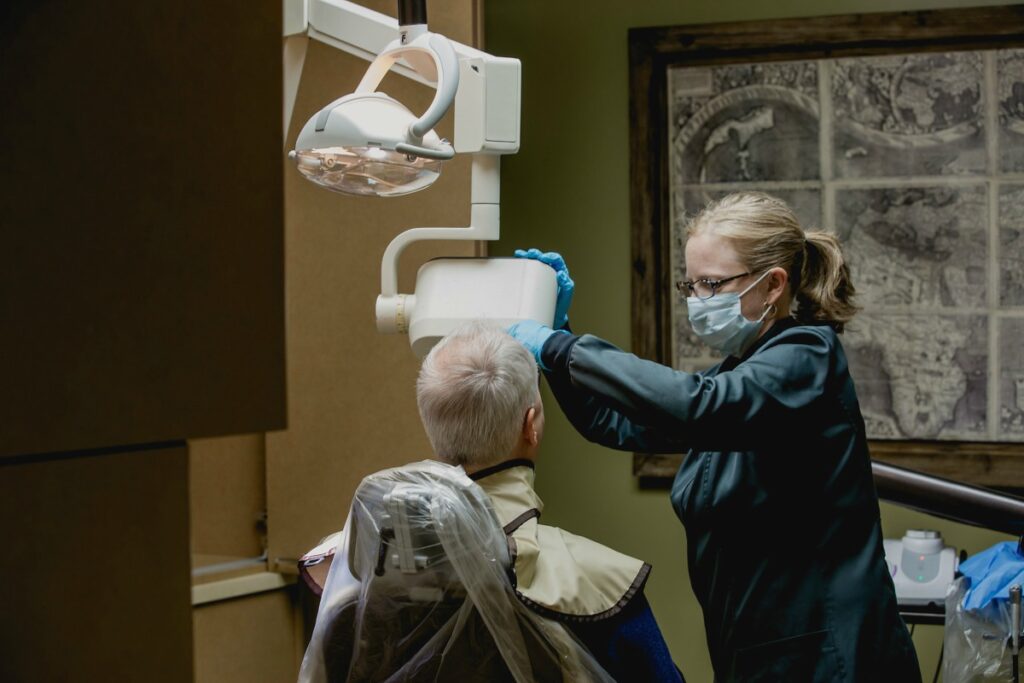
Oral Cancer Screenings
During your exam, we will conduct an oral cancer screening to look for signs of lesions and other abnormalities that could potentially be oral cancer. If we notice any abnormalities, we will take a biopsy and send it to a lab for testing or refer you to one of our trusted specialists for further investigation. Prevention and early detection are important, especially if you are a smoker or are regularly exposed to the sun.
Fluoride Treatments
Fluoride is a naturally occurring mineral that can be found in foods, water, soil, the air, and in rocks. Fluoride is an important mineral for tooth health, as it remineralizes your enamel which strengthens it and makes it more resistant to acid attacks and bacteria.
This prevents cavities and can even reverse early-stage tooth decay. We offer highly concentrated fluoride varnishes that are applied to your teeth to prevent cavities.

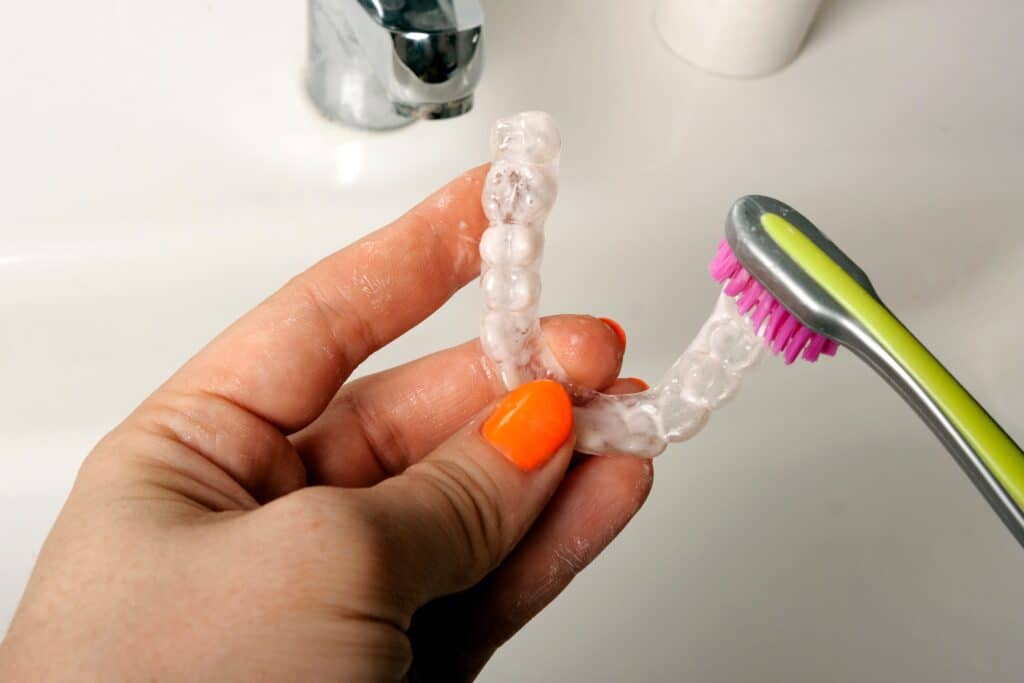
Night Guards
Night guards are custom-fitted dental appliances that serve to protect the teeth and jaw from the harmful effects of bruxism, or teeth grinding and clenching. Patients who experience bruxism, especially during sleep, may require a night guard to prevent tooth wear, enamel damage, and potential fractures. Additionally, night guards can help alleviate jaw pain and reduce the risk of temporomandibular joint disorders (TMJ), ensuring improved oral health and comfort for the patient.
Emergency Dentistry
If you are experiencing a dental emergency, don’t hesitate to call us. We can recommend the best option for you, whether it is coming in to see us here, or if it is going to visit one of our trusted specialists.
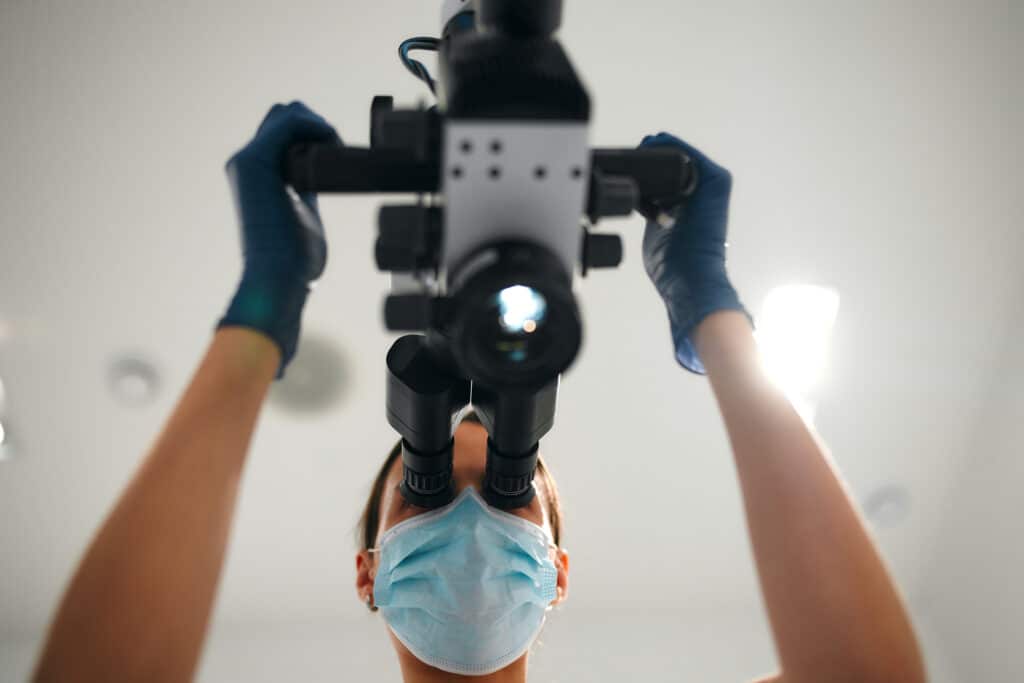
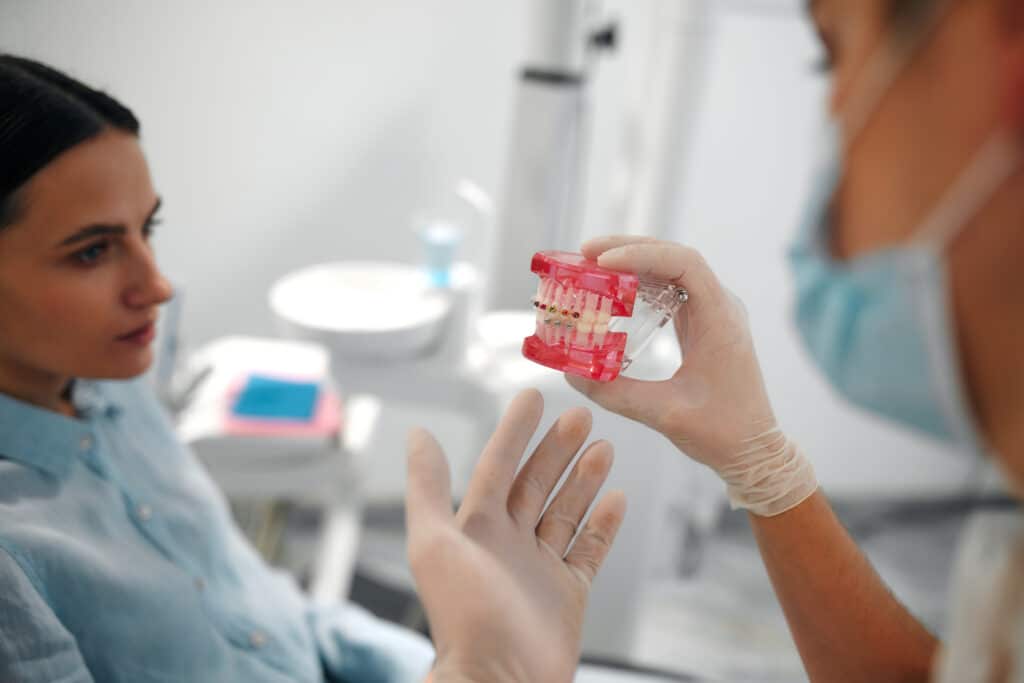
What Is A Dental Emergency?
There are quite a few problems that fall under the category of an emergency. If you aren’t sure, call us and we can tell you. Having an injury to your teeth or gums directly, especially if there is bleeding or your teeth have shifted, is definitely considered an emergency. Do what you can to stop the bleeding by putting pressure on the injured area, and call us immediately. The same goes if you fell and your teeth were part of the impact.
- Knocked-Out Teeth – If you have a knocked-out tooth, then you definitely need to come in and see us. Pick the tooth up by the white part (the crown), ideally by where you would chew. Gently rinse the tooth in a little bit of water, and place the tooth in a small jar or container filled with saliva or milk. This will preserve the tooth while you travel to our office.
- Oral Burns – If you ate something that was far too hot, this is likely going to leave you in pain. If your mouth is blistered, then drink something cool and keep the area clean. Don’t eat anything else that is hot, and don’t eat anything crunchy or salty as this could irritate the blisters. If there is no bleeding, then you can likely come in at our next appointment opening. However, if you do have bleeding, contact us and find out what the best care option would be.
- Loose Teeth – If a tooth got knocked loose, take a little paper towel or ideally gauze and hold the tooth in place, but don’t bite down hard. Come in and see us so we can determine if the tooth is still alive, and so we can set the tooth to heal if it is. Most teeth that are knocked loose are able to be salvaged, but it is important to let them heal properly.
- Pain & Swelling – See your dentist right away because gum pain or swelling can be the symptoms of an abscess (infection) that forms in gum tissue or in a tooth’s root and the area that surrounds it. There are many reasons why gums can swell, become painful, or be abscessed. It is possible that you may need a root canal or an extraction. Only a thorough exam by your dentist can identify the underlying cause.
Why Is It So Important To Get Treatment Right Away?
Typically, we recommend that you contact Dr. Cristescu for an emergency appointment as soon as you notice your dental emergency. Getting help right away has a number of benefits.
- Save your tooth – Some conditions, like a knocked-out tooth, must be treated within 1-2 hours at most for the tooth to be saved. Getting immediate care after experiencing a dental emergency will maximize the chance that your Issaquah, WA dentist will be able to save your tooth.
- Avoid further complications – Even an issue that may not seem like a dental emergency, such as a minor chip in your tooth or a pulled-out filling, could lead to further complications without treatment. A damaged tooth is vulnerable to becoming infected, which can lead to more pain, discomfort, and expensive restorative treatments like a root canal. Getting immediate treatments will help you avoid these complications, and save both time and money.
- Eliminate pain and discomfort – The pain from a toothache or a dental injury can be excruciating, and interfere with your ability to live your day-to-day life. To get treatment and relief from your pain, you need to see an emergency dentist right away.
For these reasons and more, you should make an appointment at Eastside Family Dentistry as soon as you notice a dental emergency, and get treatment at our office as soon as possible.

